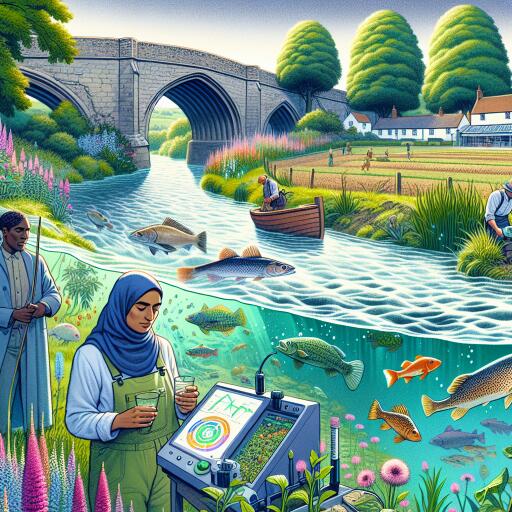
Reviving England’s Polluted Rivers through Incentivizing Farmers and Comprehensive Monitoring
With England’s rivers in a critical state of health, a rigorous approach is underway to rejuvenate these vital waterways, focusing on reducing pollution, enhancing habitats, and improving monitoring techniques. The urgency to restore our rivers to a vibrant, healthy state has never been more pressing, as recent analyses have highlighted the grim situation—only a fraction of England’s rivers meet the criteria for good ecological health. This dilemma places a spotlight on the urgent need for comprehensive strategies to breathe life back into these freshwater ecosystems.
The recent surge in awareness regarding the dire state of England’s rivers has compelled the Department for Environment, Food & Rural Affairs (Defra) to seek expert guidance on fresh water policy. Collaborating with environmental and agricultural experts, Defra has outlined a series of priority actions aimed at bolstering the biodiversity of England’s freshwater environments. The cornerstone of these actions includes mitigating agricultural pollution, one of the primary sources of river pollution, alongside wastewater.
In light of evidence showcasing agriculture’s significant contribution to river pollution, accounting for a substantial portion compared to that of water companies, there’s a push for a paradigm shift towards sustainable farming. A major point of contention is the strategic incentivization of farmers to adopt regenerative agricultural practices. These practices range from reducing reliance on harmful fertilizers and chemicals to implementing natural barriers that protect rivers from agricultural runoff.
These measures align with the broader objectives set by the Environment Act (2021), which aims for notable improvements in water quality and biodiversity. However, achieving these goals is fraught with challenges, exacerbated by climate change and the emergence of novel pollutants such as forever chemicals, which complicate the water quality targets currently in place.
Reinforcing the need for well-incentivized schemes that appeal to farmers, experts emphasize the importance of offering financial rewards for those who adopt practices that significantly reduce their environmental footprint. By providing adequate incentives, coupled with reliable and evidence-based advice, the shift towards environmentally friendly farming practices becomes more attainable.
Beyond tackling agricultural pollution, the initiative underscores the importance of enhancing freshwater habitat connectivity. This entails removing physical barriers and restoring neglected water bodies, thereby promoting a more resilient and functional ecosystem. The significance of comprehensive monitoring cannot be overstated, with calls for increased investment to track biodiversity states accurately and identify pollution sources.
Pivoting to a diverse set of indicators to monitor ecological quality also forms part of the proposed approach. Current reliance on freshwater invertebrates as primary indicators might not suffice; a broader range of parameters is essential to capture the full spectrum of ecological changes and challenges facing our rivers.
Expert insights gathered in this endeavor reveal a crucial understanding—restoring England’s freshwater biodiversity requires a multi-faceted strategy, unified by the common goal of reversing biodiversity loss. This holistic approach aims not only to address the immediate threats but also to lay a foundation for sustainable water and land management that supports vibrant freshwater ecosystems for generations to come.
The collective effort of agricultural reform, improved wastewater management, and enhanced ecosystem connectivity, augmented by a solid framework for monitoring and incentivization, sets a promising path towards revitalizing England’s rivers. As the government, environmental organizations, and the farming community move forward, the cooperation and commitment of all stakeholders are paramount to transforming these visions of cleaner, healthier rivers into reality.





Leave a Reply